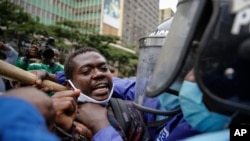Hundreds of demonstrators, mostly from poor parts of Nairobi, marched through the streets Tuesday of the Kenyan capital to protest against violent policing and the lack of basic services in their areas. Police used tear gas and arrests to block the protesters as they tried to reach the president’s office to deliver a petition.
Saba Saba is a Swahili phrase that means “Seven Seven” in English, denoting the date, the 7th of July.
It’s remembered in Kenya as the day in 1990 when opposition parties attempted to hold a series of nationwide rallies to protest the then-one party state and call for political reforms.
Hundreds were arrested and dozens killed as security forces squashed the protests.
On July 7, 2020 – the 30th anniversary of those protests – hundreds of people marched through the streets of Nairobi to demonstrate against what they describe as social and economic injustices.
Most are residents of Mathare, Kiamaiko and Dandora, some of the poorest parts of Nairobi.
Many protesters said the government is depriving them of basic needs, including the right to life.
32-year-old George Muhia, a community organizer from Kiamaiko, a poor neighborhood in Nairobi, was among those hoping to deliver a petition to the president.
Muhia said, “What the petition contains is some of the violations that we have documented as social justice centers and the enforced disappearances that have been happening even before Covid. Some of the disappearances happened in January when we lost three of our colleagues from Dandora, after three months three of our colleagues from Kiamaiko and up to date we can count at least 15 cases of enforced disappearances.”
Since January to date, Missing Voices, a coalition of at least a dozen rights groups in Kenya, has documented 100 cases of police killings.
Some of these victims, Muhia says, were people known to him.
Muhia says the economic situation in Kenya does not allow poor people to access basic things like a good education and job opportunities.
Aileen Wanjiku is the research campaigner at Missing Voices.
“This year, the big amend for the march is just implementation of the 2010 constitution, because what people are seeing is that when it comes to the implementation of article 43, this is the right to water, right to housing, these rights are actually not being respected or implemented by the government, and then there is the big one which is the right to life," said Wanjiku. "So, we are also seeing that – this one is being disrespected in different ways, we have violent policing, we have a lot of people dying at the hands of police officers.”
Police used tear gas to break up the march Tuesday, and they arrested more than 50 people.
The protesters were unable to reach the president’s office to deliver their petition.




